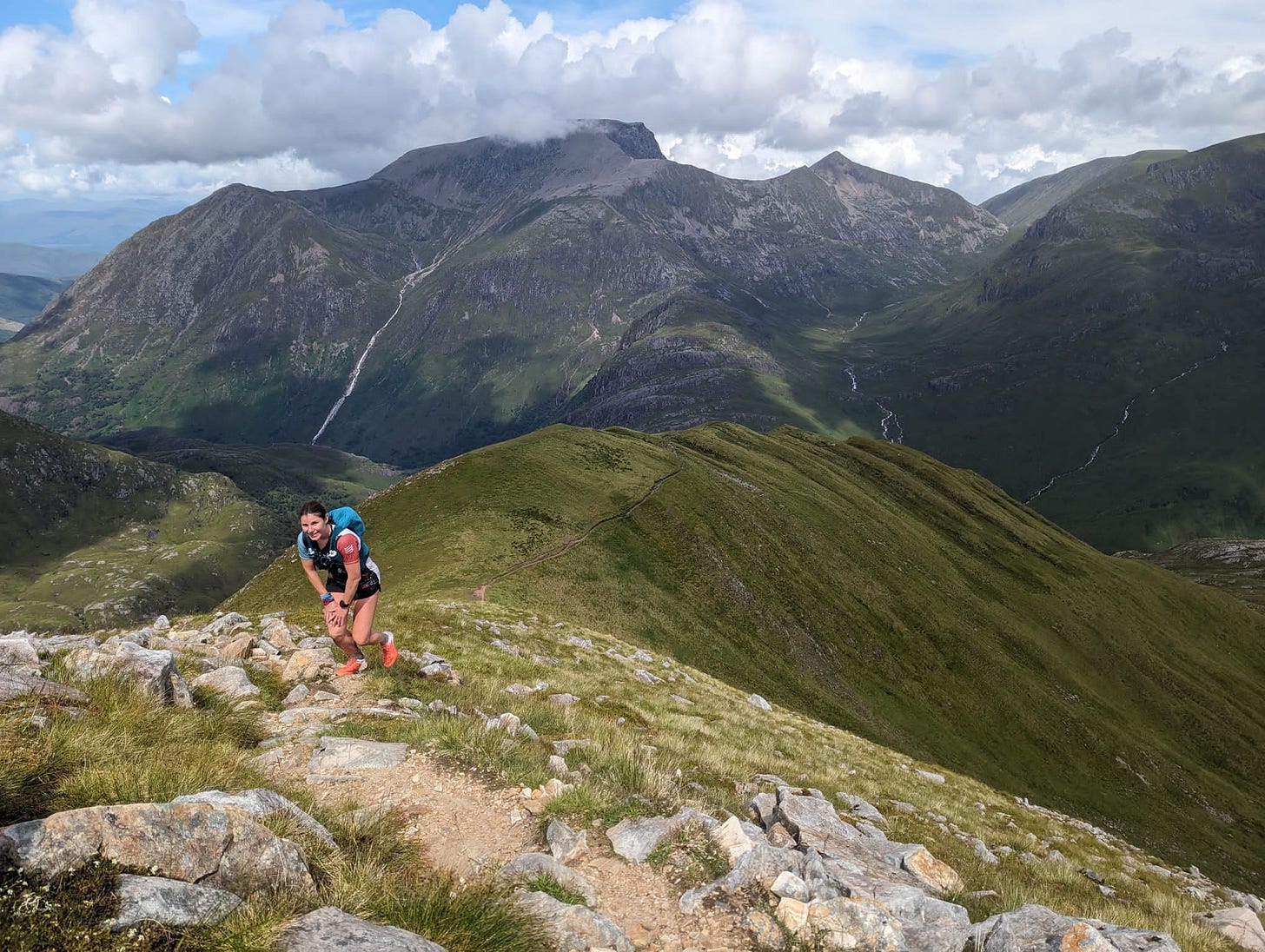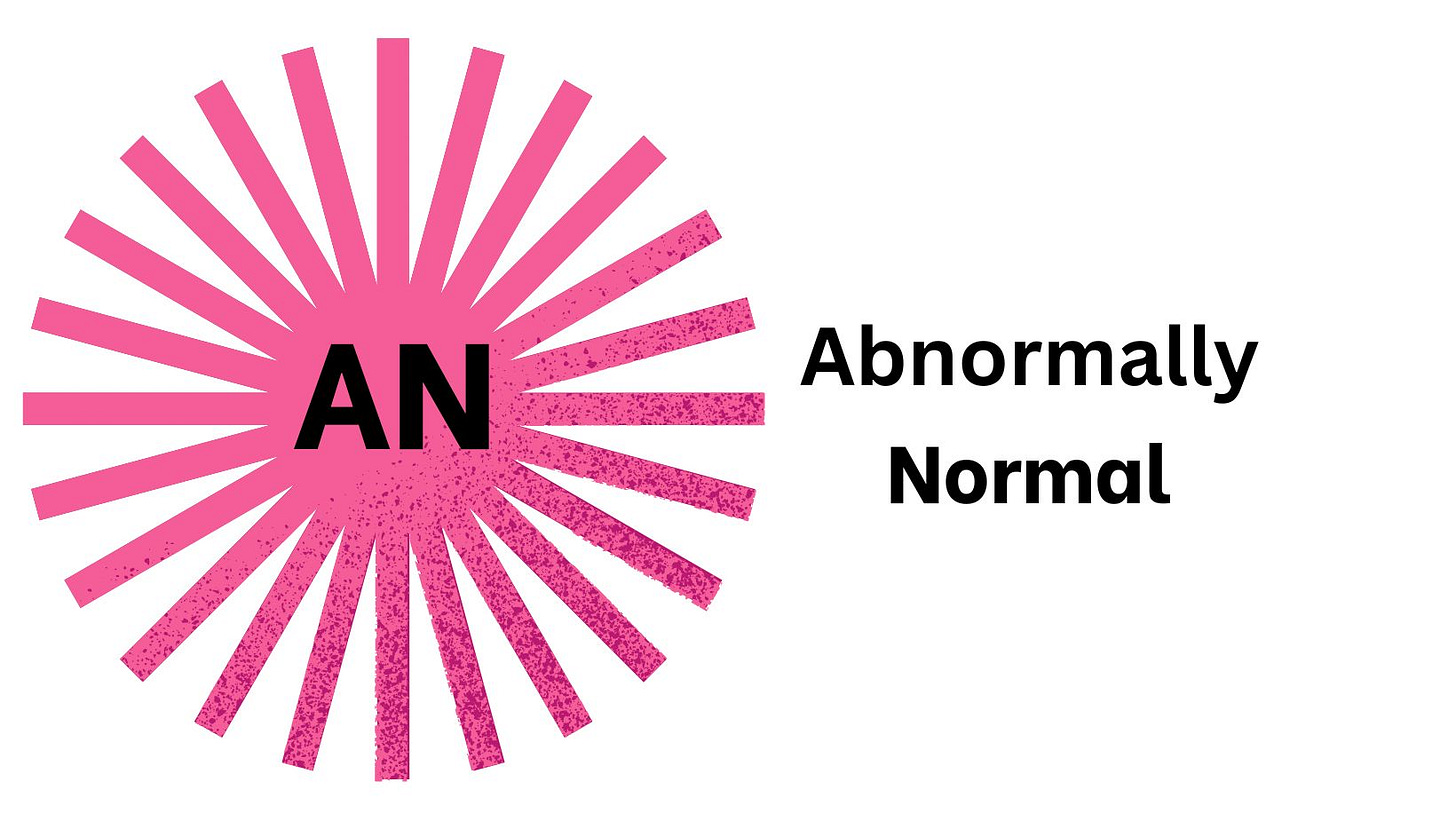Why I’m No Longer a Runner, Just Someone Who Runs
The dangers of enmeshing our identity with our hobby
Abnormally Normal is entirely reader-supported, and while it will always be fully accessible to all, if you read here regularly and benefit from the content, please consider becoming a paid subscriber. Or, you can show appreciation for my work and buy me a coffee.
Running is the only time I feel completely myself.
Despite being besotted with running, I can’t help but think most of us runners are running away from something. I certainly was, and maybe I still am.
When we pound the pavement or skip over trails, the past and future cease to exist. And in that small snapshot of time, all that matters is the metronome of our running strides and the rhythm of our hearts.
I am infatuated with and indebted to running. It is my salvation and escape. Running helps this disassociated body feel something. Really feel something.
And despite my love for its ethereal gift, I’m pulling away from its hold. I used to be so proud to call myself a runner, and now I am slowly untangling from this moniker.
As with Forrest Gump, running transcended me from a shy misfit to an enigmatic leader.
I won the school cross-country several years in a row. In my early teens, I became known as “Ali the Runner.” Being the best at something set me apart from others; it brought admiration, recognition, and acceptance.
Suddenly, this meek little nobody was somebody.
And although I ran to quell the demons in my mind and inflict a form of self-harm on my self-loathing body, something else happened. My running got me noticed.
Feelings of being a misfit had me lacing up my trainers in the first place. And somehow, this very motion induced some semblance of acceptance. Running gifted me with that core human need we all desire — a sense of belonging.
I am not judged or mocked when I’m in a running embrace. Running is a master of diversity, equality and inclusion. Anyone, well nearly anyone, can run.
Running became my way of connecting with people. It became my life.
It seeped into every nook and cranny and stood as my muse in study, professional purpose, and personal therapist. I weaved it into the subject of my university degree, and it inspired me to set up several running organisations and businesses. Not satisfied with my running lot, I became a running coach specialising in ultra running and qualified as a sports massage therapist.
Running was there for me through the trials and tribulations of life. I ran through blinding tears and waves of elation. Running was my confidante.
Each good race result produced a flurry of new followers on social media. People wanted to know me when I did well, and my ego revelled in this relevance. Subconsciously, I learned my worth depended on my running achievement or what I could give to the running world.
Meanwhile, I aspired to run further and faster. I consumed running and let it consume me because here in the running community, I thought I was understood. I thought I belonged.
Upon reflection, I used all these endeavours to seek validation. To help make sense of my space in the world and my relevance to it. My ego internalised external feedback.
But it was never enough.
When things came to a grinding halt due to injury, burnout, or simply arriving at a certain point in my therapy journey, my unravelling segued into an awakening.
What’s it all for?
I had to pull out of a big race halfway. My body wasn’t playing. Or maybe my mind had given up. Perhaps the undertones of delusion had already started to seep through.
Am I even a runner if I can’t complete my A race? Here I was, an accomplished ultra runner, unable to do the thing I thought I loved the most, the thing others expected of me.
And that’s when it started to dawn on me. I had lost sight of myself. I had become a pawn in the running world. I used to run for the mental freedom it graced me with, but now, the same momentum was a vice to my brain.
Capitalism has sunk its teeth into running and stolen its simplicity and accessibility.
All around me, I see people wanting more. It is not enough to run a marathon, we must run an ultra. It is not enough to run a 50-mile ultra; we must run 100 miles. Running these distances requires kit and a lot of it.
Then there are the races dotted all over the world with eye-watering entry costs, and these costs don’t factor in travel, accommodation, the kit list, and the cost of physio, training, and gear in the lead-up.
It doesn’t factor in the emotional cost, the cost to loved ones, or the cost of consumption.
To be classed as a runner, we must look a certain way, dress a certain way, live a certain way. We are prescribed what it means to be a runner, and we lap this up — I lapped this up — because any deviation from this is met with rejection.
In the book No Logo, which explores bullying tactics by big brands, the author Naomi Klein names sporting brands such as Nike and Lululemon as exploiting the human need to belong. She suggests that these companies sell more than sportswear. They sell identification and meaning, a manipulative promise that with their attire, we will be part of the gang.
If we have the money, we can buy inclusion and kudos. We can buy our place in this world. We can buy belonging.
Very few people want to stand alone, conspicuous and vulnerable. Humans need safety in numbers. We need our tribe. However, if connections fade when we no longer feed into a system, I would argue that the associated belonging we experienced was conditional and superficial.
In the running world, the attitude is “If it’s not on Strava (a specific sporting social media platform), it didn’t happen,” meaning if a run isn’t recorded on Strava, it didn’t happen — reinforcing this perpetual need to prove ourselves to others.
Once I was awake to the rules of being a runner, I saw it everywhere: my fellow runners clambering for belonging through running clubs, coaching groups, and races, donning the latest caps, socks, or shorts, proving their claim as a runner with social media posts and a flurry of hashtags and stampeding to connect with the next up-and-coming running superstar.
Anyone not subscribing to this—well, their identity as a runner is called into question. They aren’t a real runner if they haven’t proven their worth.
I realised that my attachment to my identity as a runner kept me feeling like I didn’t belong and wasn’t good enough.
Unless I ran with the right people, entered the right races, wore the right clothes, uploaded the right social media content, and ran the right distances and speeds, then the mythical gatekeepers of running would reject my application to be considered a runner. Perhaps I would expire as a runner and then even as a human.
If I wasn’t a runner, would I be annihilated?
We live in a world that pushes us to want more—bigger, better, faster, stronger. Gone are the days when we could revel in achieving a personal best time in a race; now, we immediately move the goalposts and push ourselves for more. Arbitrary numbers are used as bargaining tools, with manipulative promises of happiness and belonging.
And while I believe it is a healthy trait of human nature to want to do and be our best, I also recognise that constantly chasing more is unhealthy. There comes a time for everyone where the healthiest thing is to find in ourselves an acceptance that we are enough and we have enough.
Over all these years of trying hard to keep my identity as a runner, I had become someone I didn’t recognise.
I started running to feel alive. And now running was making me feel disconnected and inadequate. I was paying more attention to the metrics on my watch than the sensations within my body.
The more I withdrew from the running spheres around me, the more irrelevant I became in the running world, but perhaps most notably, I finally became relevant to myself again.
I can’t help but connect the dots between my healing journey and cutting the umbilical cord with my identity as a runner. Maybe now that I’m learning to deal with my past, I don’t need to run away from it.
Some of my old running community may see me pulling away as a fall from grace, like an embittered toddler throwing her toys out of the pram. But I see it as coming full circle; I am simply returning to myself—to the person who runs along trails for sheer joy and recognising the privilege of it. I’m back to that person who finds nourishment and belonging sweating in nature with good friends and dogs.
I haven’t stopped running. Oh no, this love affair is enduring and long-lasting. The only difference is that now I don’t need a race result to dictate my self-worth. I’m back to running to connect with myself. It’s been a long time coming, but I finally recognise I’ve always belonged to this world, irrespective of my running pedigree.
There is no denying the therapeutic properties of running. It served as my therapy until I went to actual therapy and was able to see the way my identity as a runner was problematic in itself.
Running can be healing, but allowing it to enmesh with our identity can be harmful. I am slowly untangling from its clutches. Finally, here I am, a cacophony of values and passions, one of which is that I love to run.
And that is enough.
Thanks for reading. If you enjoyed this piece, leave us a comment on Instagram or share it with a friend and subscribe to the Abnormally Normal newsletter.
You may also enjoy my other Substack Life Without Children, a place for readers and writers of live without children, whether by choice or circumstances.
You can also find my writings and musings on Medium, where I write about well-being, feminism & personal growth.







Perfect timing for me to read this, I loved running so much it became my full time job and now after 10 years of coaching I feel running has lost it’s simplicity and uniqueness. The commercialisation has created an air of exclusivity that has, for me, sucked some of the joy out of running. I now find myself wearing my smartwatch less and less, its strap battered, I should replace it but subconsciously I’m wearing my normal dress watch, it feels like I’m slowly breaking up with my watch!
Like this a lot. I run quite consistently, and whenever people ask me how far I run, or how many miles, my answer is always "I have no idea". I've never run for the results. If I had, I would have stopped running years ago. I only do it because it makes me feel good.